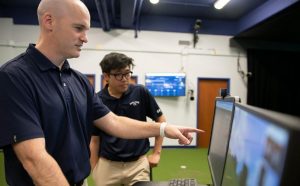
As a PGA of America member, I spent three years of study in the association’s Professional Golf Management Associate Program. With a full-time career outside the golf industry at the time and a family at home, I spent many nights, weekends, and lunch breaks at work learning the business of golf. From teaching and player development to golf cart fleet management and food and beverage services, the program covers all aspects of being a PGA Golf Professional.
For those individuals who know at a younger age that golf is the business for them, there are 18 colleges and universities across the U.S. that offer the PGA Golf Management University Program, which allows students to earn a Bachelor’s degree and the PGA of America Class A membership at the same time. Other institutions in North America also offer golf management programs that are currently not affiliated with the PGA. Their curriculum may differ slightly, but the mission is the same—to grow the game of golf from the business side of the lesson tee.
What to look for in a program
If working in the golf industry is one’s desire, golf management university programs are the way to go. Finding the right one for you is not much different from any other field of study. Whether pursuing a golf management degree or another program with a golf management component, it’s important to consider costs, location, and internship opportunities. As is the case with all fields of study, colleges and universities have differing results in graduation rates and job placement success—do your due diligence before committing to any one of them. There are some golf industry-specific factors to look for, however:
- Is the program accredited by the PGA? Note: many excellent programs are not currently accredited by the PGA. If all other factors check the boxes on your list, you should not make a decision simply on this facet.
- Is golf management the major itself, or is it one aspect of the program?
- Are there quality golf facilities on campus or nearby offsite? Whether a top golf course or high-tech learning center, having the tools that drive education is vital to continued growth.
- Consider the faculty and staff at any school you’re considering. What are their goals? What are their successes? Are they PGA Professionals themselves?
- What internship opportunities are available during the program? Are they local, national, or international? Will you be immersed in the golf operation or just cleaning clubs and carts all day?
- What are recent graduates of the program doing after attainment of their degree and Class A status? This could be a precursor to what’s in store for you after graduation.
Perks of completing the program
There are benefits of participating in a university program that the associate program that I completed does not offer. For instance, coaching through the university program is in person, as opposed to the individual bookwork that I had to face. You have one-on-one mentorship with teachers and professors as well as group engagement to motivate and help build a network of seasoned professionals, alumni, and future pros. Building those connections and relationships will benefit the graduates of the university program well into their careers. In addition, whether PGA accredited like the University of Nevada or not PGA accredited like Keiser University College of Golf in West Palm Beach, Florida, the curriculum to navigate is all-encompassing and comprehensive. No matter which institution you chose, you will have a support group of like-minded golf pros to share ideas and practice your golf game with—both important aspects of being a golf professional and mentor in the industry.

The programs are run by expert teachers, coaches, club fitters, and experienced golf professionals who know what golf course operators are looking for in their hiring practices. Learning the rules of golf, club management, retail, food and beverage, golf cart fleet management, golf fitness, and agronomy help produce well-rounded golf professionals. Upon graduation from any of the colleges and universities that facilitate these extensive golf management programs, you will have a leg up on associate program grads, as well as on other individuals vying for open golf course positions. With a proven record of success throughout the industry, golf management university programs serve as the most reliable feeder system of the next generation of golf professionals.
Your education through a golf management university program is the first step towards building a highly successful career in golf. Once ensconced in a job or the early stages of your career, you may very well find that one aspect of the golf business intrigues and excites you more than others. The PGA of America also allows you to become specialized in one or more facets of the job such as executive management, teaching and coaching, operations, and more. From there, you will become certified and recognized as an expert in that aspect of the job—it’s a very valuable statement to add to your resume. 
How golf operators can leverage these institutions to recruit young professionals
Individuals graduating from these programs are young, tech-savvy, and motivated. Tara McKenna, Director of the PGA Golf Management Program at Florida Gulf Coast University, says it is important to understand generational differences to effectively recruit young PGA Professionals. She receives hundreds of requests for interns and new employees and emphasizes the importance of matching candidates with the right opportunities. “Generation Z is more adept with social media and ultimately enthralled by visual and interactive multimedia communications. The recruitment process has become very competitive, and younger head professionals are earning a “leg-up” on their competition by creating 3-5-minute promotional videos. These videos include aerial drone footage of the facility, rich photos and messages from the staff highlighting the many reasons why these aspiring professionals should intern or consider working at their facility,” McKenna added.
McKenna admitted that enrollment across many universities is down and was before the pandemic struck. “Therefore, our young professionals are gaining leverage and influence in the jobs they choose and responsibilities they assume. To truly get the “best of the best” from what we have to offer, employers should tap into their younger employees and utilize functional knowledge of technology and social media to promote great internships and career potential.”
Golf course management, many of whom may have successfully navigated one of the same golf management university programs, understand the benefits of working with the directors of these programs to find the right fit for them. There are often more jobs than candidates to fill them, so golf facilities must understand that the individuals they acquire from one of these programs will expect, and be qualified for, responsibility and opportunity to grow. They should leave the cart washing and club cleaning duties to their local high school students. But even this demographic of job candidates seeks more from a job these days.
Conclusion
Golf is experiencing an amazing renaissance due to the pandemic. Facilities across North America are welcoming new golfers every day, and retaining them has become the number one priority. To properly do so, facilities need to offer great services, effective instructions, frequent on-course playing opportunities, and an emphasis on the fun and social aspects of the game.
Dr. Robb Wade, Director of the PGA Golf Management Program at North Carolina State University says, “It is vital that we match each candidate with the appropriate facility and management team. Doing so will help us maximize the benefits to students and facilities. This comes through communication on our part with the hiring professionals. We don’t tout our graduates as ready to take over as head professionals, but through effective internships during their academic career, we feel they will be ahead of the game upon graduation.”

Golf management programs at colleges and universities have a set curriculum and fierce oversight. Students are taught to play better golf and properly share those skills with their students. Golf is big business, and managing a course takes a plethora of knowledge that is taught within these programs.
Going at it alone, as I did, is still a viable option for many individuals who have completed their college journey or are seeking golf as a second career. For the rest of you budding young golf pros, you are the future of the game, and there’s no better place to get your start than in a golf management university program.

News you care about. Tips you can use.
Everything your business needs to grow, delivered straight to your inbox.



